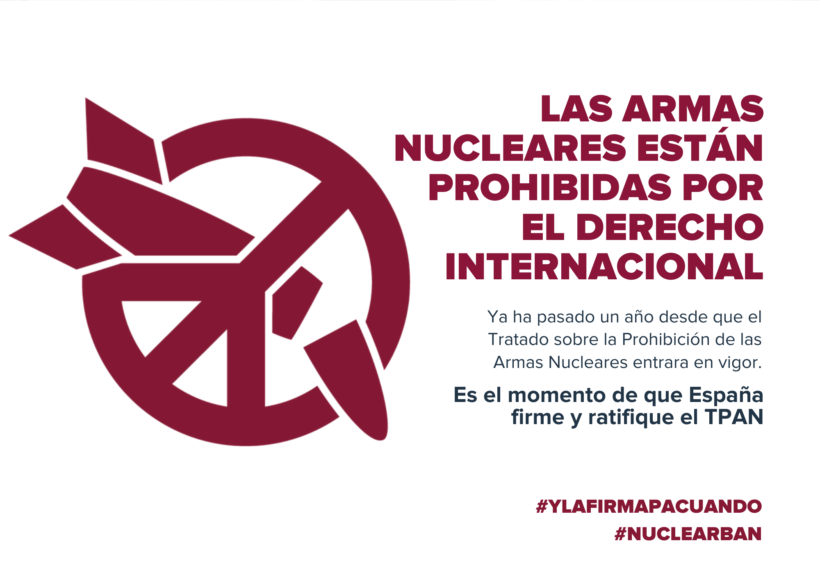On the first anniversary of its entry into force, more than thirty organisations, including Pressenza, are calling on the government to exercise leadership for peace through the Spanish state’s accession to the UN Treaty on the Prohibition of Nuclear Weapons (TPNW).
The petition has been sent to the government of Pedro Sánchez through various channels. We have spoken to some of the representatives of the signatory organisations.
Below we reproduce the letter delivered to government records and presented to the media by Josep Mayoral -Mayor of Granollers and president of Mayors for Peace (Europe)-, and Ana Barrero -president of AIPAZ-, among others.
PETITION
On the first anniversary of the entry into force of the TPNW, 59 states have already ratified it, 30 have signed it and ratification is pending, and another 49 have expressed their support for the Treaty at the UN.
We call on the Spanish government to accede to the Treaty on the Prohibition of Nuclear Weapons and to support its subsequent ratification in the Congress of Deputies.
And as a first step in this direction, we call on Pedro Sánchez’s government to follow the example of Norway and Germany, two NATO partners, and for Spain to attend the first Conference of States Parties to the TPNW in Vienna from 22 to 24 March 2022 as an observer state.
The Spanish government has an excellent opportunity to exercise peace leadership vis-à-vis its EU and NATO partners by aligning itself with the majority will of the Spanish and world population in favour of the effective prohibition of nuclear weapons.
Indeed, a recent survey established that 89 per cent of the Spanish population believes that Spain should join the Treaty (only 4 per cent oppose it) and various initiatives have been supported by several parliamentary groups. Despite all efforts, the goal of the Spanish government’s accession to the NPT has not yet been achieved.
What is the TPNW and what does it bring?
On 7 July 2017, after a decade of mobilisation by the International Campaign to Abolish Nuclear Weapons (ICAN) and its partners, the United Nations General Assembly adopted a global agreement to ban nuclear weapons, officially known as the Treaty on the Prohibition of Nuclear Weapons (TPNW). A Treaty that highlights the catastrophic humanitarian impact of any use of nuclear weapons. Two and a half years later, on 22 January 2021, the Treaty entered into force after securing the necessary ratification by 50 countries.
This new legal instrument offers a powerful alternative to a world in which there is no end to threats of mass destruction. Prior to the adoption of the Treaty, nuclear weapons were the only weapons of mass destruction that were not subject to an outright ban, despite their catastrophic, widespread and persistent humanitarian and environmental consequences.
The new agreement thus fills a major gap in international law. This Treaty is based on the rules and principles of humanitarian law and in no case may countries develop, test, produce, manufacture, transfer, possess, stockpile, use or threaten to use nuclear weapons, or permit the stationing of such weapons on their territory. The TPNW also obliges parties to provide assistance to those who have suffered as a result of the use and testing of nuclear weapons around the world, and to take measures to remediate contaminated environments. The TPNW thus contributes to protecting the human rights of victims and the environment.
What difference does it make to the Nuclear Non-Proliferation Treaty (NPT)?
Critics of the TPNW argue that it undermines the Nuclear Non-Proliferation Treaty (NPT) that entered into force in 1970. But reality shows that the TPNW has not been effective, although the total number of nuclear warheads has decreased, the number of countries possessing them has doubled, and we are witnessing a new race to modernise nuclear weapons.
The TPNW, unlike the NPT, obliges to assist victims of nuclear weapons use or testing and to take measures to restore environmentally contaminated areas. A Treaty for the Protection of Life on Earth and Human Rights. The TPNW is the first multilateral agreement that comprehensively bans nuclear weapons by declaring them ILLEGAL WEAPONS and also the first agreement that contains provisions to address the humanitarian consequences related to the testing and use of nuclear weapons. It has also been considered the first feminist law on nuclear weapons.
From the preamble it recognises their disproportionate impact on women, girls and indigenous peoples, urges more equitable participation of women in disarmament processes, assistance to victims and reparations for the environmental damage they cause. By explicitly and unequivocally prohibiting the use of nuclear weapons, the TPNW sends a strong signal: their use would be unacceptable from an ethical, environmental and humanitarian perspective and would also be illegal under international humanitarian law (IHL).
Nuclear weapons are the most inhumane and indiscriminate weaponry ever created. They violate international law, cause serious damage to the environment, undermine national and global security, and divert vast public resources from meeting human needs and sustaining life on the planet. For those of us working for a culture of peace, human rights, the rights of planet Earth, women’s and children’s rights, total and universal disarmament, justice, research and education for peace, remembrance, dialogue, universalist values, cooperation, multilateralism…, the ICAN Campaign and the entry into force of the TPNW offer an extraordinary opportunity to continue to join forces for the construction of world peace.
While the risks of ignoring the Treaty are unaffordable, the opportunities for peace that open up with its ratification challenge the Spanish state and its entire population.






